Iraqi Election Watch provides inside information from Iraq on the historic Jan. 30 elections compiled by FDD staff and fellows.
|
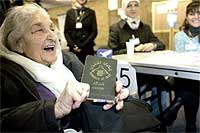
- From Oswald Sobrino (Catholic Analysis):The AP photo by Adam Butler records an 83-year-old Iraqi preparing to vote in London. The AP reports that "[t]his is the first time she has participated in an Iraqi election" (see other AP report). The faces and smiles tell the story of freedom. All eyes are on the Iraqi elections this weekend. We pray that God will protect the brave who dare to go and vote for a decent and dignified future for themselves and their families (see London Timesonline report, "Voting fever takes hold of a people finally free to choose"). Thanks to President Bush and our military for making this future possible. Since the picture speaks for itself, no further commentary is needed today.
- John Schultz (Catholic Light) passes along an email from Battalion Chaplain Lyle Shackelford delivering the voting machines and the ballots to villages and cities throughout Iraq, who asks for prayers on behalf of all who read:. . . There is unlimited potential for God's presence in this process but if we do not pray, then our enemy will prevail (See Ephesians 6:10-17). A prayer vigil prior to the end of the month may be an innovative opportunity for those within your sphere of influence to pray. This is a political battle that needs spiritual intervention. A powerful story about God's intervention in the lives of David's mighty men is recorded in 2 Samuel 23:8-33. David and his warriors were victorious because of God's intervention. We want to overcome those who would stand in the way of freedom. David's mighty men triumphed over incredible odds and stood their ground and were victorious over the enemies of Israel. (Iraqi insurgents' vs God's praying people). They don't stand a chance.
I will pray with my soldiers before they leave on their convoys and move outside our installation gates here at Tallil. My soldiers are at the nerve center of the logistic operation to deliver the voting machines and election ballots. They will be driving to and entering the arena of the enemy.
This is not a game for them. It is an historic mission that is extremely dangerous. No voting machines or ballots, No elections. Your prayer support and God's intervention are needed to give democracy a chance in this war torn country. Thank you for your prayer support for me and my family. Stand firm in your battles.
- Lane Core Jr. (Blog from the Core explains why our future hangs in the balance on January 30-31, 2005:If we do not succesfully plant the seeds of democratic government in the Middle East — beginning with Iraq, and expanding thence over the years & decades & generations -- our children and grandchildren will be condemned to live in a world where freedom of religion and conscience -- where the rule of law and respect for individual dignity -- won't even be memories because they will have been obliterated.
The power of the United States of America — military, financial, diplomatic, and cultural — to project its force around the world, to remove despotic regimes and enforce the beginnings of freedom amongst peoples who have never known it, or have no living memory of it, is what stands between us and the Dark Ages of the Future.
That, and the courage of Iraqi citizens — those who stand for office, and those who vote. Please keep them, and our soldiers in Iraq, in your prayers these days.
- Senator "No Blood for Oil" Kennedy took the opportunity to raise the spectre of Vietnam, calling for an immediate withdrawal of U.S. troops following the election. Belmont Club responds, marshalling the witness of Chaldean Bishop Louis Sako of Kirkuk.
- The Daily Demarche has a special requestFor all the Bush haters out there, for all the pundits who think it is clever to spell Republican with a triple "k", I have a challenge for all of you. For one day, less probably by the time you hear of this, devote some of that energy to wishing success to the people of Iraq in this election. Forget for one day your raging anger and calls for us to abandon Iraq. It’s not going to happen, and for this single day we could use your support. You can resume your attacks on the Administration on Monday - because you live in a free land.
Ali -- an Iraqi blogger in Baghdad:
All my life like all Iraqis, I was not in control of my life. I started looking to myself as a humanist many years ago. Maybe it's because I lost belief in my government and even sometimes in my country and my people. My country was just a stupid large piece of dirt that meant nothing and offered nothing to me but suffering and humiliation. . . .Now, and thanks to other humans, not from my area, religion and who don't even speak my language, I and all Iraqis have the real chance to make the change. Now I OWN my home and I can decide who's going to run things in it and how and I won't waste that chance. Tomorrow as I cast my vote, I'll regain my home. I'll regain my humanity and my dignity, as I stand and fulfill part of my responsibilities to this part of the large brotherhood of humanity. Tomorrow I'll say I'M IRAQI AND I'M PROUD, as being Iraqi this time bears a different meaning in my mind. It's being an active and good part of humanity. Tomorrow I and the Iraqis that are going to vote will rule, not the politicians we're going to vote for, as it's our decision and they'll work for us this time and if we don't like them we'll kick them out! Tomorrow my heart will race my hand to the box. Tomorrow I'll race even the sun to the voting centre, my Ka'aba and my Mecca. I'm so excited and so happy that I can't even feel the fear I though I would have at this time. I can't wait until tomorrow.
| Joyful Iraqi Exiles Vote in Landmark Election by Suleiman al-Khalidi. Reuters. Jan. 28, 2005. Man drives to Calgary to vote in Iraqi election (14 hours!) - CBC News. Jan. 28, 2005. Iraqis in Australia cast first votes in election, by Michael Perry. Reuters. Jan. 28, 2005. |
- Jeff Jarvis (BuzzMachine has a roundup of quotes from Iraqi bloggers' as they anticipate the vote. "They all should be an inspiration -- and perhaps a shame -- to those of us who have become blase about democracy and freedom, who growl over our choices and don't even bother showing up at the polls. Democracy is fragile and precious; we forget that. These people don't." Here's a Iraqi bloggers covering the election, also courtesy of Jeff.
- FriendsofDemocracy.Org, another organization bringing you "ground-level election news from the Iraqi people."
- Radioblogger has a photo-blog of proud Iraqis voting in El Toro, California. Lots of smiling faces and an interesting story -- two Iraqis men "came to vote today, with their families, and recognized each other. They started talking and realized that they hadn't seen each other in fifty years. They were about ten years old in Iraq the last time they saw each other." What a reunion!
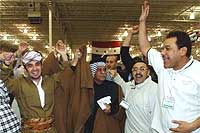
- How do you begin to contain the emotion of contributing to freedom for the very first time in over 50 years. And for many - the first time ever in their life?" -- Kevin McCullough captures the emotions of many Iraqis with another series of photos.
- Michelle Malkin shares a relevant question from a reader: "Why don't we see the human shields at the polls in Iraq? They were willing to protect Iraq from bombs before the war started. Why aren't they protecting Iraq now?"
- From BlogsofWar:
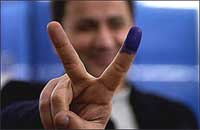 Atheer Almudhafer, from Falls Church, Va., gives the Iraqi sign of victory after casting his absentee ballot at the New Carrollton, Md., voting station, Jan. 28, 2005. His finger is marked with indelible blue ink, intended to prevent double voting. "I give the sign of peace and voting. Together it is victory." [Defense LINK]
Atheer Almudhafer, from Falls Church, Va., gives the Iraqi sign of victory after casting his absentee ballot at the New Carrollton, Md., voting station, Jan. 28, 2005. His finger is marked with indelible blue ink, intended to prevent double voting. "I give the sign of peace and voting. Together it is victory." [Defense LINK]
- A history lesson from Arthur Herman ("Sic Temper Tyrannis: 1649 and now" NRO, January 28, 2004):This election, which many hope will spark a democratic revolution for the Middle East, falls on the same day -- January 30 -- as the event which set in motion the modern West's first democratic revolution more than 365 years ago. It was on that day in 1649 that King Charles I of England was beheaded after his formal trial for treason and tyranny, an epoch-shattering event that destroyed the notion of divine right of kings forever, and gave birth to the principle that reverberates down to today, from President Bush's inaugural address last week to the Iraqi election this Sunday: that all political authority requires the consent of the people. Although few like to admit it now, it was Charles's execution, along with the civil war that preceded it and the political turmoil that followed, that established our modern notions of democracy, liberty, and freedom of speech. When Thomas Jefferson wrote that "the tree of liberty must sometimes be refreshed from time to time with the blood of patriots and tyrants," he was thinking primarily of the legacy of the English civil war.
- Captain's Quarters relays this report from FoxNewsThousands of people are now walking a 13-mile stretch between Abu Ghraib and Gazaliyah to cast votes in the elections, military sources tell Fox News. The mass march has been caught by unmanned drones, and Fox says they will soon have pictures of the subtle demonstration of the Iraqi desire for liberty.
More as it develops. Fox also reports long lines in most polling stations, with some even calling for more ballot materials as they run out of ballots faster than they anticipated.
- Arthur Chrenkoff has more reactions of Iraqi voters (E-Day & E-Day, Part II, including this from sometime Chrenkof correspondent:Haider Ajina: "I just called my father in Baghdad to see if he and the rest of my Iraqi family over there have voted yet. He said we were all just heading out the door, but we will wait and talk to you (chuckling). I heard a strength and joy in his voice and could hear the rest of my relatives in the back ground. It sounded like a family reunion. My 84 year old Iraqi Grandmother will be voting for the first time in her life. My father (a naturalized U.S. Citizen) said we are all getting ready to go vote in a school near by. This school was just being built when I left Iraq in the late 70's. I know where it is and I can picture my father, uncles aunties and cousins along with the rest of the family walking through my old neighborhood to that school and vote. My father said 'For the first time in my life I voted in the U.S. and now I can vote in Iraq. We want our voices to count, we want to decide our future and we want the world to know we have a voice in our future and in our government, this will give the Iraqi government true legitimacy, just like in America'.
"I can now dream of the day when I can take my family to meet my extended family and the places were I played and grew up. They will also see what our men and women in our military fought for.
"To all the men and women who have served and serving in Iraq, to all the families of those who have paid the ultimate price to all those who have suffered during their service in Iraq, my family’s and my deepest thanks, gratitude and pride both from the U.S. and Iraq for all the sacrifices, endurance and service for our great country and Iraq and the Iraqis. God bless all of you and keep you safe."
- Voices from the Revolution - Friends of Democracy interviews with citizens from the Zy Qar province and reports that the Election Goes Smoothly in Kirkuk ("During the elections the kids have nothing to do as everyone is busy voting").
- More photoblogging the election from Ryan in Baghdad ("Farmer by genetics, Lawyer by training, currently "vacationing" in Iraq and advising the Iraqi government on border security issue"). Ryan cites a pertinent quote from Natan Sharansky's The Case For Democracy: The Power of Freedom to Overcome Tyranny and Terror:Any time ordinary people are given the chance to choose, the choice is the same: freedom, not tyranny; democracy, not dictatorship; the rule of law, not the rule of the secret police."
| BREAKING NEWS! - Iraqi Voting Disrupts News Reports of Bombings, by Scott Ott [Scrappleface.com]
(2005-01-30) -- News reports of terrorist bombings in Iraq were marred Sunday by shocking graphic images of Iraqi "insurgents" voting by the millions in their first free democratic election. Despite reporters' hopes that a well-orchestrated barrage of mortar attacks and suicide bombings would put down the so-called 'freedom insurgency', hastily-formed battalions of rebels swarmed polling places to cast their ballots -- shattering the status quo and striking fear into the hearts of the leaders of the existing terror regime. Hopes for a return to the stability of tyranny waned as rank upon rank of Iraqi men and women filed out of precinct stations, each armed with the distinctive mark of the new freedom guerrillas -- an ink-stained index finger, which one former Ba'athist called "the evidence of their betrayal of 50 years of Iraqi tradition." Journalists struggled to put a positive spin on the day's events, but the video images of tyranny's traitors choosing a future of freedom overwhelmed the official story of bloodshed and mayhem. |
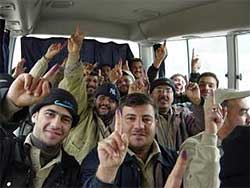
- Belmont Club asks: "Did we win?", comparing a number of MSM (mainstream media) reports on Iraqi voter turnout. Speaking to Reuters, University of Michigan Professor Juan Cole called the elections "a joke," and reinforces his prediction in a gloomy post to his own blog; however, eyewitness reports of an incredible voter turnout from BBC News Reporter's Log beg to differ.
- Jeff Jarvis (Buzzmachine) believes this is "Not an election, a revolution" and provides an additional roundup of news headlines. Jeff asks a question which every American should think about:This morning, I asked myself whether I would go to vote if I thought I could be bombed at the polling place or shot because of my blue finger. I don't think I'd have that courage. Most Americans would not (hell, most of us don't vote even in the lap of safety). Remember that every single Iraqi who came to vote today is a victory for democracy.
- Another roundup of Iraqi bloggers, also courtesy of Jeff.
- Captain's Quarters is reporting impressive turnout numbers by region; a change of heart at Reuters, and a welcome suprise from the Queen of Pessimistic Journalism: The New York Times acknowledges victory!
- More analysis of the MSM's change in temperament from Instapundit, along with a great picture of Iraqis displaying "the ink-stained finger of democracy."
| Amid Attacks, a Party Atmosphere on Baghdad's Closed Streets, by Dexter Filkins. New York Times January 30, 2005. Iraqis Express Pride, Hope at Election, by Ellen Knickmeyer. Associated Press. January 30, 2005. Iraq election declared 'success' BBC News. January 30, 2005. |
- Iraqi bloggers Mohammed and Omar @ Iraq The Model conclude: "The People have won"The first thing we saw this morning on our way to the voting center was a convoy of the Iraqi army vehicles patrolling the street, the soldiers were cheering the people marching towards their voting centers then one of the soldiers chanted "vote for Allawi" less than a hundred meters, the convoy stopped and the captain in charge yelled at the soldier who did that and said:< p>"You're a member of the military institution and you have absolutely no right to support any political entity or interfere with the people's choice. This is Iraq's army, not Allawi's".
This was a good sign indeed and the young officer's statement was met by applause from the people on the street. The streets were completely empty except for the Iraqi and the coalition forces ' patrols, and of course kids seizing the chance to play soccer! . . .
I walked forward to my station, cast my vote and then headed to the box, where I wanted to stand as long as I could, then I moved to mark my finger with ink, I dipped it deep as if I was poking the eyes of all the world's tyrants.
I put the paper in the box and with it, there were tears that I couldn't hold; I was trembling with joy and I felt like I wanted to hug the box but the supervisor smiled at me and said "brother, would you please move ahead, the people are waiting for their turn".

- Iraqis fight a lonely battle for democracy, The Guardian January 30, 2005. Michael Ignatieff explains why "whatever your view of the war, you should embrace today's election":Just as depressing as the violence in Iraq is the indifference to it abroad. Americans and Europeans who have never lifted a finger to defend their own right to vote seem not to care that Iraqis are dying for the right to choose their own leaders. . . .
The Bush administration has managed the nearly impossible: to turn democracy into a disreputable slogan.
Liberals can't bring themselves to support freedom in Iraq lest they seem to collude with neo-conservative bombast. Anti-war ideologues can't support the Iraqis because that would require admitting that positive outcomes can result from bad policies. And then there are the ideological fools in the Arab world, and even a few in the West, who think the 'insurgents' are fighting a just war against US imperialism. This makes you wonder when the left forgot the proper name for people who bomb polling stations, kill election workers and assassinate candidates - fascists.
- Liberty Marches Forward - Citizen Smash, aka. "Indepundit", has a another roundup of photos and stirring quotes:We shall pay any price, bear any burden, meet any hardship, support any friend, oppose any foe, in order to assure the survival and the success of Liberty." -- John F. Kennedy
"The battle is now joined on many fronts. We will not waver; we will not tire; we will not falter; and we will not fail. Peace and freedom will prevail." – George W. Bush
- Via Little Green Footballs, an email from Mike, a major stationed in the Sunni Triangle:The polls closed at 1700 (5PM) our time and 8AM CST but the initial reports are that 72% of the Iraqis voted. Folks we should be ashamed. We can’t get that many people to vote in the US and no one is trying to kill us.
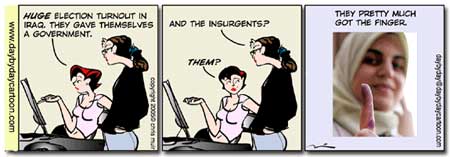
- Via Michelle Malkin, a child's display of solidarity with Iraqi voters:10-year-old Billings girl, Shelby Dangerfield won't be going to the polls. But she will be will be showing her support by wearing ink on her finger - just like those Iraqis who have voted."10-year-old supports vote of Iraqi people" Billings Gazette January 30, 2005 .
"It will symbolize our support if we wear ink on our fingers," Shelby said. "We're not forcing them to vote, but they have a chance to do it and they should take that chance."
- President Congratulates Iraqis on Election The White House. January 30, 2005.
So that's the roundup for the weekend . . . stay tuned to the various blogs mentioned above for the results and the aftermath, and please keep the people of Iraq, together with our troops, in your prayers.






